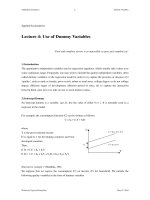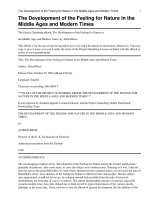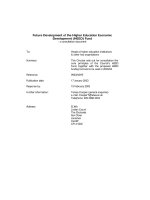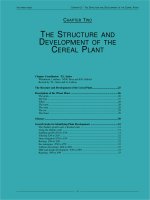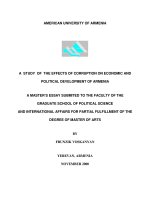OB lecture 30 development of management thoughts
Bạn đang xem bản rút gọn của tài liệu. Xem và tải ngay bản đầy đủ của tài liệu tại đây (295.83 KB, 51 trang )
Lecture 30
Development of
Management Thoughts
Development of
Management Thoughts
1. Frederick Taylor’s Scientific Management
2. Henry Fayol’s Classical Administration
3. Elton Mayo’s Human Relations School
1. Scientific Management
Frederic Taylor
Scientific Management
The Term ‘Scientific Management’
was coined by Louis D. Brandeis, later
a supreme court justice to
get attention for Taylor’s work.
Frederic Winslow Taylor
1856 - 1915
Time and Motion Study
Taylor thought that by analyzing work, the
"One Best Way" to do it would be found. He
is most remembered for developing the
Time and Motion Study. He would break
a job into its component parts and measure
each to the hundredth of a minute.
Study at Bethlehem Steel
Shovel of pig iron.
75 men, averaged 12.5 ton per days per man
Increased to 47.5 ton per day.
By using the correct method in pick up,
walk, sit, and rest.
Illustration
455 assignments
3 assignments/hours
8 hours per day –full times
455/3/8 = 18 days
Rational Economic Needs of
Motivation
More work, more pay.
60% more pay for workers who moved 47.5
tons a day.
Assumptions of Scientific
Management
1. There is a best way of doing way to do
job.
2. Management must determine the way and train the
worker to do it the best way.
What’s Wrong
What’s Wrong
1. ‘Deterministic’ vs ‘probabilistic’
Not ‘deterministic’
The best way of doing things can not be
determined in advance.
Therefore, we need Continuous
Improvement, or Kaizen in Japanese
Continuous Improvement
Keep improving
William Edward Deming
PDCA
PDCA
What’s Wrong
1. ‘Deterministic’ vs ‘probabilistic’
2. Mangers know the best way to do things?
What’s Wrong
1. ‘Deterministic’ vs ‘probabilistic’
2. Only mangers know the best way to do things?
3. Workers are motivated by ‘rational’ rewards only ,
e.g. pay?
TQM
Besides managers, workers also know the best way to
do things
Therefore, TQM (Total Quality Management) involves
all parties
Assembly Line
Taylor thinking influenced Henry Ford.
Ford pioneered the modern assembly line
production
Mass production
2.Classical Administration
Henri Fayol
Henri Fayol
French Mining Engineer
And later director of a mine
His book
"Administration Industrielle et Générale
1915
Principles of Henri Fayol
1. Division of Labour
2. Authority and Responsibility
3. Discipline
4. Unity of Command
5. Unity of Direction
6. Fair Remuneration
7. Subordination of individual interests to the general interest
8. Centralization
9. Scalar Chain of Command
10. Order
11. Equity
12. Stability of tenure of personnel
13. Initiative
14. Esprit de corps
Principles of Henri Fayol
1.
2.
3.
4.
5.
6.
7.
8.
9.
10.
11.
12.
13.
14.
Division of work. This principle is the same as Adam Smith's 'division of labour'. Specialisation increases
output by making employees more efficient.
Authority. Managers must be able to give orders. Authority gives them this right. Note that responsibility
arises wherever authority is exercised.
Discipline. Employees must obey and respect the rules that govern the organisation. Good discipline is the
result of effective leadership, a clear understanding between management and workers regarding the
organisation's rules, and the judicious use of penalties for infractions of the rules.
Unity of command. Every employee should receive orders from only one superior.
Unity of direction. Each group of organisational activities that have the same objective should be directed
by one manager using one plan.
Subordination of individual interests to the general interest. The interests of any one employee or group
of employees should not take precedence over the interests of the organisation as a whole.
Remuneration. Workers must be paid a fair wage for their services.
Centralisation. Centralisation refers to the degree to which subordinates are involved in decision making.
Whether decision making is centralised (to management) or decentralised (to subordinates) is a question
of proper proportion. The task is to find the optimum degree of centralisation for each situation.
Scalar chain. The line of authority from top management to the lowest ranks represents the scalar chain.
Communications should follow this chain. However, if following the chain creates delays, crosscommunications can be allowed if agreed to by all parties and superiors are kept informed.
Order. People and materials should be in the right place at the right time.
Equity. Managers should be kind and fair to their subordinates.
Stability of tenure of personnel. High employee turnover is inefficient. Management should provide
orderly personnel planning and ensure that replacements are available to fill vacancies.
Initiative. Employees who are allowed to originate and carry out plans will exert high levels of effort.
Esprit de corps. Promoting team spirit will build harmony and unity within the organisation
Division of Work
It leads to higher productivity
Authority
Parity of responsibility and authority.
You have authority provided that you take
responsibility

